日本文化风俗超详细(英文版)
- 格式:ppt
- 大小:12.07 MB
- 文档页数:15
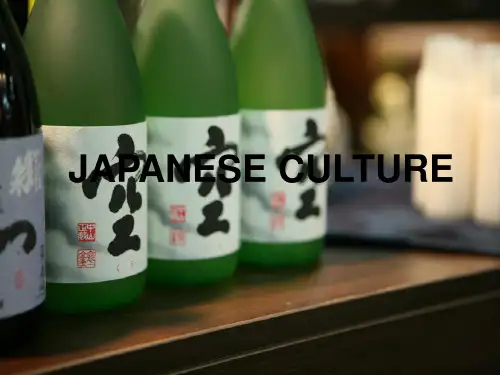
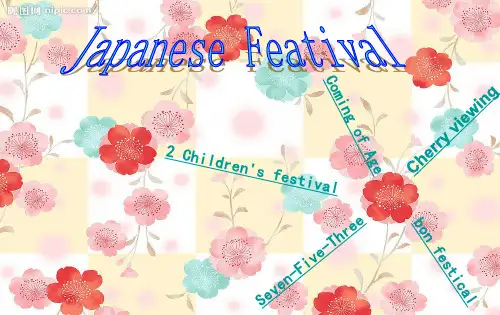
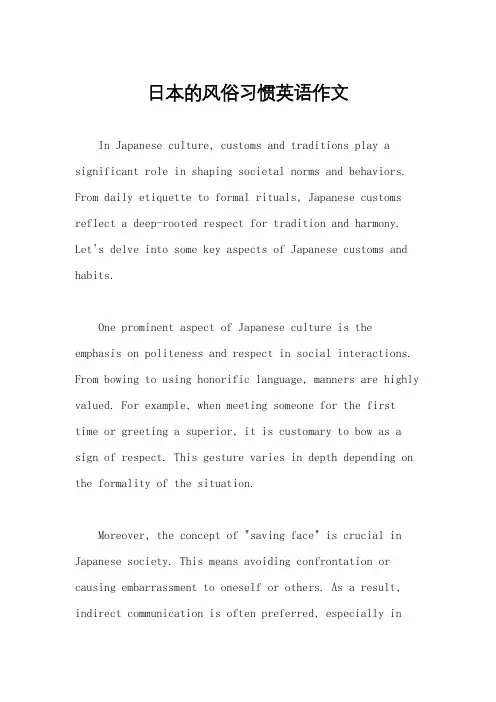
日本的风俗习惯英语作文In Japanese culture, customs and traditions play a significant role in shaping societal norms and behaviors. From daily etiquette to formal rituals, Japanese customs reflect a deep-rooted respect for tradition and harmony. Let's delve into some key aspects of Japanese customs and habits.One prominent aspect of Japanese culture is the emphasis on politeness and respect in social interactions. From bowing to using honorific language, manners are highly valued. For example, when meeting someone for the first time or greeting a superior, it is customary to bow as a sign of respect. This gesture varies in depth depending on the formality of the situation.Moreover, the concept of "saving face" is crucial in Japanese society. This means avoiding confrontation or causing embarrassment to oneself or others. As a result, indirect communication is often preferred, especially indelicate or sensitive matters. It's common to use subtle cues and non-verbal expressions to convey one's thoughts or feelings.Another aspect of Japanese customs is the importance of harmony and group cohesion. This is evident in various social settings, such as the workplace and community activities. Decision-making often involves consensus-building and considering the collective welfare rather than individual preferences. Additionally, hierarchical relationships are respected, with deference shown to those in authority or seniority.Closely tied to Japanese customs are traditional ceremonies and rituals. These ceremonies mark significant life events and seasons, such as coming-of-age ceremonies, weddings, and New Year celebrations. Each ritual is imbued with symbolism and cultural meaning, reinforcing a sense of identity and belonging.Japanese cuisine also reflects cultural values and customs. The meticulous preparation of food, attention topresentation, and emphasis on seasonality are integral tothe dining experience. Meals are often shared with others, fostering camaraderie and strengthening social bonds. Moreover, there are specific etiquettes to follow, such as using chopsticks correctly and expressing gratitude before and after a meal.Furthermore, the concept of omotenashi, or hospitality, is deeply ingrained in Japanese culture. Whether welcoming guests into one's home or providing service in aprofessional setting, the focus is on anticipating theneeds of others and ensuring their comfort and satisfaction.In addition to these customs, Japan's rich history and religious traditions continue to influence contemporary practices. Shinto and Buddhist rituals are observed in various aspects of life, from shrine visits to funerals. These spiritual beliefs contribute to a sense of reverence for nature and ancestors.In conclusion, Japanese customs and habits are multifaceted, reflecting a blend of tradition, etiquette,and cultural values. From everyday interactions to formal ceremonies, these customs serve to maintain harmony, respect, and a sense of community in Japanese society.。
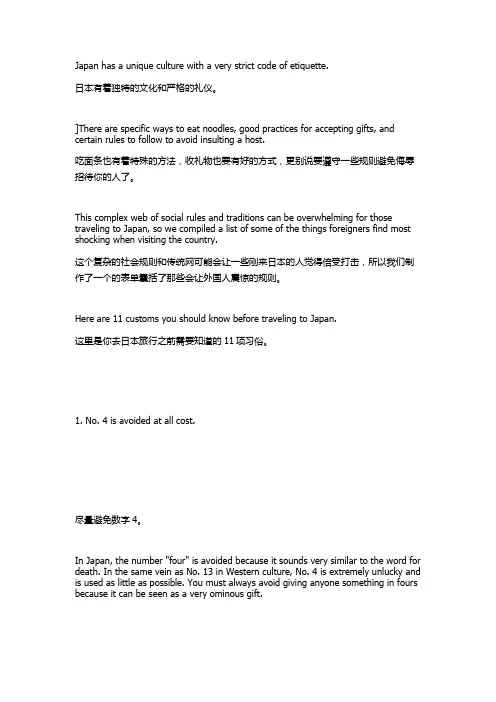
Japan has a unique culture with a very strict code of etiquette.日本有着独特的文化和严格的礼仪。
]There are specific ways to eat noodles, good practices for accepting gifts, and certain rules to follow to avoid insulting a host.吃面条也有着特殊的方法,收礼物也要有好的方式,更别说要遵守一些规则避免侮辱招待你的人了。
This complex web of social rules and traditions can be overwhelming for those traveling to Japan, so we compiled a list of some of the things foreigners find most shocking when visiting the country.这个复杂的社会规则和传统网可能会让一些刚来日本的人觉得倍受打击,所以我们制作了一个的表单囊括了那些会让外国人震惊的规则。
Here are 11 customs you should know before traveling to Japan.这里是你去日本旅行之前需要知道的11项习俗。
1. No. 4 is avoided at all cost.尽量避免数字4。
In Japan, the number "four" is avoided because it sounds very similar to the word for death. In the same vein as No. 13 in Western culture, No. 4 is extremely unlucky and is used as little as possible. You must always avoid giving anyone something in fours because it can be seen as a very ominous gift.在日本,数字"4"因为听起来像"死"字所以被尽量避免。
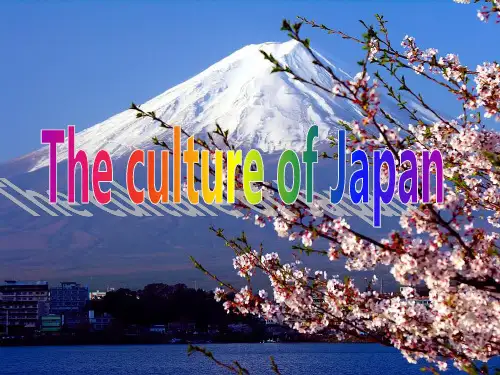
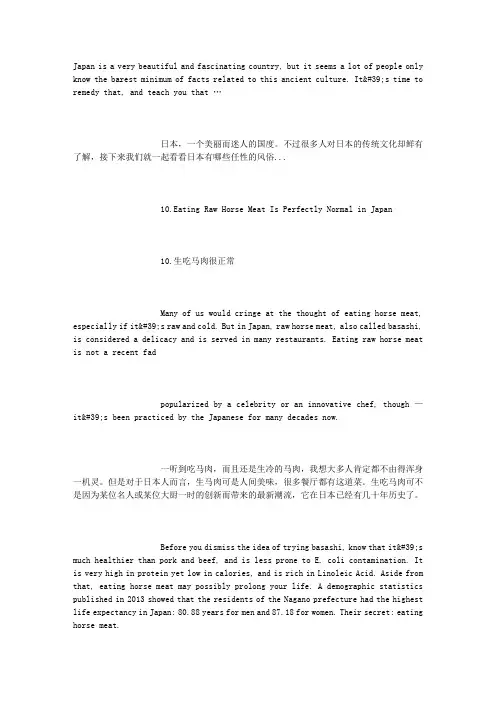
Japan is a very beautiful and fascinating country, but it seems a lot of people only know the barest minimum of facts related to this ancient culture. It's time to remedy that, and teach you that …日本,一个美丽而迷人的国度。
不过很多人对日本的传统文化却鲜有了解,接下来我们就一起看看日本有哪些任性的风俗...10.Eating Raw Horse Meat Is Perfectly Normal in Japan10.生吃马肉很正常Many of us would cringe at the thought of eating horse meat, especially if it's raw and cold. But in Japan, raw horse meat, also called basashi, is considered a delicacy and is served in many restaurants. Eating raw horse meat is not a recent fadpopularized by a celebrity or an innovative chef, though —it's been practiced by the Japanese for many decades now.一听到吃马肉,而且还是生冷的马肉,我想大多人肯定都不由得浑身一机灵。
但是对于日本人而言,生马肉可是人间美味,很多餐厅都有这道菜。
生吃马肉可不是因为某位名人或某位大厨一时的创新而带来的最新潮流,它在日本已经有几十年历史了。
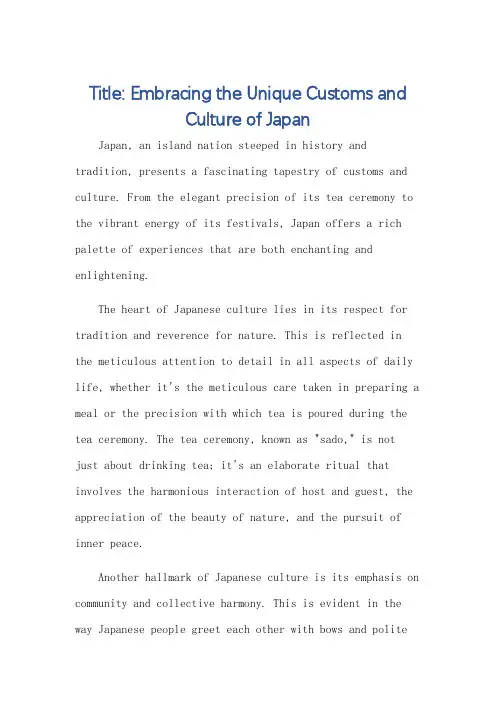
Title: Embracing the Unique Customs andCulture of JapanJapan, an island nation steeped in history and tradition, presents a fascinating tapestry of customs and culture. From the elegant precision of its tea ceremony to the vibrant energy of its festivals, Japan offers a rich palette of experiences that are both enchanting and enlightening.The heart of Japanese culture lies in its respect for tradition and reverence for nature. This is reflected in the meticulous attention to detail in all aspects of daily life, whether it's the meticulous care taken in preparing a meal or the precision with which tea is poured during the tea ceremony. The tea ceremony, known as "sado," is notjust about drinking tea; it's an elaborate ritual that involves the harmonious interaction of host and guest, the appreciation of the beauty of nature, and the pursuit of inner peace.Another hallmark of Japanese culture is its emphasis on community and collective harmony. This is evident in the way Japanese people greet each other with bows and politephrases, demonstrating respect and consideration for others. The concept of "wa," which translates to harmony or unity,is ingrained in Japanese society and is reflected invarious aspects of life, from social interactions to theway businesses are conducted.Festivals and celebrations are an integral part of Japanese culture, with each season marked by special events and traditions. The cherry blossom viewing, known as "sakura-viewing," is a national obsession, with people flocking to parks and temples to admire the delicate beauty of the flowers. The autumn moon viewing, on the other hand, is a time for family reunions and the appreciation of thefull moon against the backdrop of autumn foliage.The visual arts of Japan are also a testament to itsrich cultural heritage. From the delicate brushstrokes of traditional Japanese painting to the intricate carvings of lacquerware, Japanese artists have perfected the art of combining beauty and functionality. The art of origami, the folding of paper into intricate shapes, is another exampleof Japanese creativity and craftsmanship.In conclusion, Japan's customs and culture are atapestry of tradition, harmony, and natural beauty. Fromthe precision of its tea ceremony to the vibrantcelebrations of its festivals, Japan offers a unique and enchanting experience that leaves a lasting impression on those who visit. Embracing these customs and traditions,one can truly appreciate the depth and richness of Japanese culture.**拥抱日本独特的风俗文化**日本,这个岛屿国家拥有丰富的历史和传统,展现了一幅迷人且多姿多彩的风俗文化画卷。
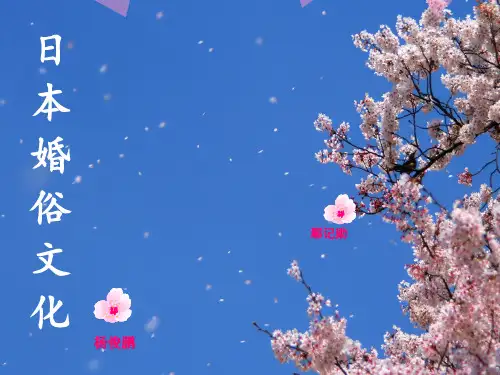

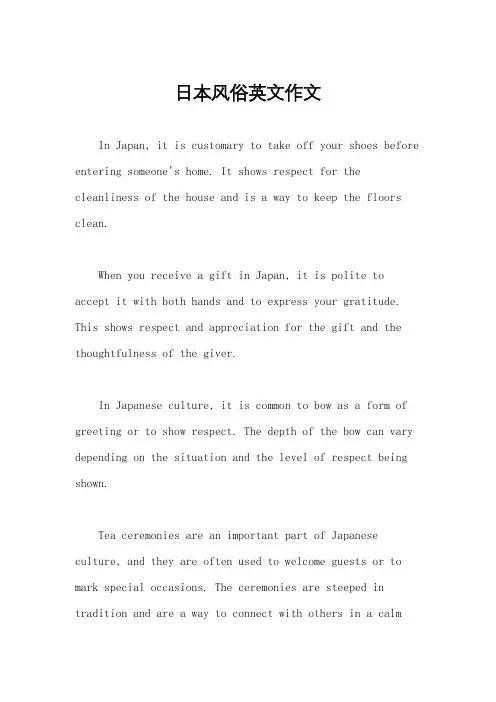
日本风俗英文作文In Japan, it is customary to take off your shoes before entering someone's home. It shows respect for the cleanliness of the house and is a way to keep the floors clean.When you receive a gift in Japan, it is polite to accept it with both hands and to express your gratitude. This shows respect and appreciation for the gift and the thoughtfulness of the giver.In Japanese culture, it is common to bow as a form of greeting or to show respect. The depth of the bow can vary depending on the situation and the level of respect being shown.Tea ceremonies are an important part of Japanese culture, and they are often used to welcome guests or to mark special occasions. The ceremonies are steeped in tradition and are a way to connect with others in a calmand peaceful setting.Japanese onsens, or hot springs, are a popular way for people to relax and unwind. It is customary to wash and clean your body thoroughly before entering the onsen as a sign of respect for others who will be sharing the hot spring.In Japan, it is customary to slurp your noodles when eating, as it is a sign that you are enjoying the meal. It is also a way to cool down the hot noodles and to enhance the flavors.When visiting a shrine or temple in Japan, it is customary to cleanse your hands and mouth at thepurification fountain before approaching the main building. This is a way to show respect for the sacred space and to purify oneself before entering.In Japanese business culture, it is customary to exchange business cards with a bow. This is a way to showrespect and to acknowledge the importance of the business relationship.。
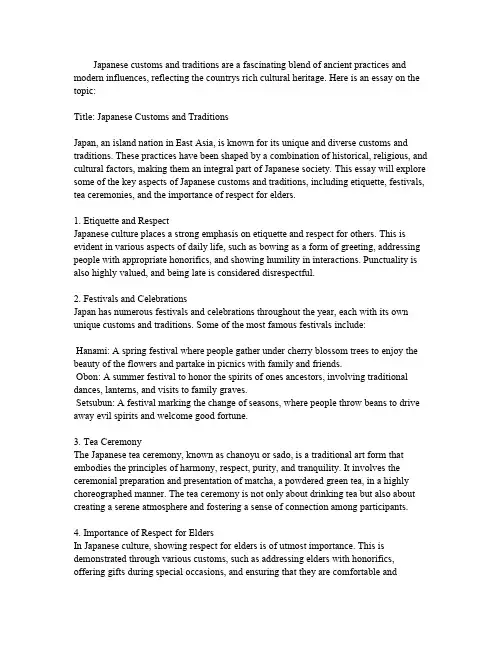
Japanese customs and traditions are a fascinating blend of ancient practices and modern influences,reflecting the countrys rich cultural heritage.Here is an essay on the topic:Title:Japanese Customs and TraditionsJapan,an island nation in East Asia,is known for its unique and diverse customs and traditions.These practices have been shaped by a combination of historical,religious,and cultural factors,making them an integral part of Japanese society.This essay will explore some of the key aspects of Japanese customs and traditions,including etiquette,festivals, tea ceremonies,and the importance of respect for elders.1.Etiquette and RespectJapanese culture places a strong emphasis on etiquette and respect for others.This is evident in various aspects of daily life,such as bowing as a form of greeting,addressing people with appropriate honorifics,and showing humility in interactions.Punctuality is also highly valued,and being late is considered disrespectful.2.Festivals and CelebrationsJapan has numerous festivals and celebrations throughout the year,each with its own unique customs and traditions.Some of the most famous festivals include:Hanami:A spring festival where people gather under cherry blossom trees to enjoy the beauty of the flowers and partake in picnics with family and friends.Obon:A summer festival to honor the spirits of ones ancestors,involving traditional dances,lanterns,and visits to family graves.Setsubun:A festival marking the change of seasons,where people throw beans to drive away evil spirits and welcome good fortune.3.Tea CeremonyThe Japanese tea ceremony,known as chanoyu or sado,is a traditional art form that embodies the principles of harmony,respect,purity,and tranquility.It involves the ceremonial preparation and presentation of matcha,a powdered green tea,in a highly choreographed manner.The tea ceremony is not only about drinking tea but also about creating a serene atmosphere and fostering a sense of connection among participants. 4.Importance of Respect for EldersIn Japanese culture,showing respect for elders is of utmost importance.This is demonstrated through various customs,such as addressing elders with honorifics, offering gifts during special occasions,and ensuring that they are comfortable andwellcared for.This respect extends to teachers,bosses,and other authority figures as well.5.Traditional Arts and CraftsJapan has a rich tradition of arts and crafts,which are considered an essential part of its cultural heritage.Some of the most notable examples include:Ikebana:The art of flower arrangement,which emphasizes the beauty of nature and the balance of colors and shapes.Origami:The art of paper folding,creating intricate designs and shapes from a single sheet of paper.Pottery and ceramics:Japan is famous for its highquality pottery,such as Arita ware and Kutani ware,which are known for their intricate designs and vibrant colors.6.Traditional ClothingTraditional Japanese clothing,such as the kimono and yukata,are still worn on special occasions and festivals.The kimono is a long,Tshaped robe with intricate patterns and designs,while the yukata is a lighter,casual garment typically worn during summer events.7.Food CultureJapanese cuisine is known for its emphasis on fresh ingredients,delicate flavors,and beautiful presentation.Traditional meals often consist of a variety of dishes,including rice,fish,vegetables,and soup.Eating with chopsticks is the norm,and there are specific customs associated with their use,such as not sticking them vertically into a bowl of rice, as this is considered disrespectful.In conclusion,Japanese customs and traditions are a reflection of the countrys deeprooted cultural values and beliefs.From etiquette and respect to festivals and the arts,these practices play a vital role in shaping the identity and way of life of the Japanese people. Understanding and appreciating these customs can provide a deeper insight into the rich tapestry of Japanese culture.。